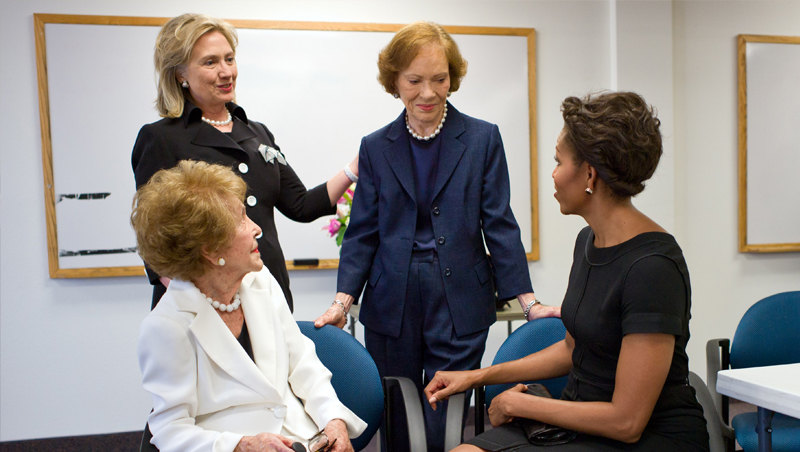Each American First Lady has put her own touch on the White House, her public image, and often policy priorities. New research from academics in our department, Ilka Gleibs, Kristen Hendricks, and Tim Kurz (University of Bath), shows that the role of presidential candidates’ spouses* goes well beyond that. These women are, in fact, co-constructing the identity of their husband as a leader, as well as co-crafting the perception of what it means to be American.
Kristen Hendricks was, in fact, an MSc student in our department when she began collaborating with Ilka Gleibs, and this specific research was the results of their continued work together.
By analysing speeches made at national party conventions in U.S. elections campaigns from 1992 to 2012, Gleibs and her colleagues examined the role that a spouse can play in identity-formation and management of a presidential candidate’s leadership. While other research has looked at the First Lady as an individual and power-player in the White House, no one has addressed this question of a spouse’s unique ability to reveal a candidate’s personal attributes, experiences, and quirks and the resulting consequences of this identity construction.

This research draws on the extensive literature on identity formation, perceptions of leadership, and the group processes that underlie this. Notably, this work emphasizes that the construction of a leader’s identity is a highly social process, involving many more people and voices than just the leaders. Through this lens, Gleibs and her colleagues identified the specific role played by the candidates’ wives and their ability to speak authentically and with authority about both their husband as well as the nation at large. So it’s not only the candidate that they’re defining; it’s also the idea of “being American” as well.
One particularly notable finding relates to the national myths that the candidates’ wives helped construct. The ideas of “family values”, “defense of freedom”, and “the American Dream” will be familiar to any American who voted between the years 1992 and 2012. This research highlights the acute attention that these women paid to each topic in their speeches. Additionally, their voice as “a wife/mother” gives them greater ability to align these national myths with the characteristics of their husbands, which they can flesh out with personal knowledge.
Gleibs and her colleagues also point out an important caveat to this work: it’s probably different for a spouse of a female candidate. Female candidates and their spouses will likely encounter difficulties in successfully using the spouses’ voice and personal insight to construct the candidate’s identity. So if the American electorate nominates more women as their parties’ presidential candidates, we’ll see different dynamics at play.
*Since this analysis did not include the 2016 election, all of the Republican and Democratic candidates’ spouses were women during this period.
This summary is based on this article:
Gleibs, Ilka H., Hendricks, Kristen, & Kurz, Tim. (2017). Identity mediators: Leadership and identity construction in campaign speeches of American presidential candidates’ spouses.